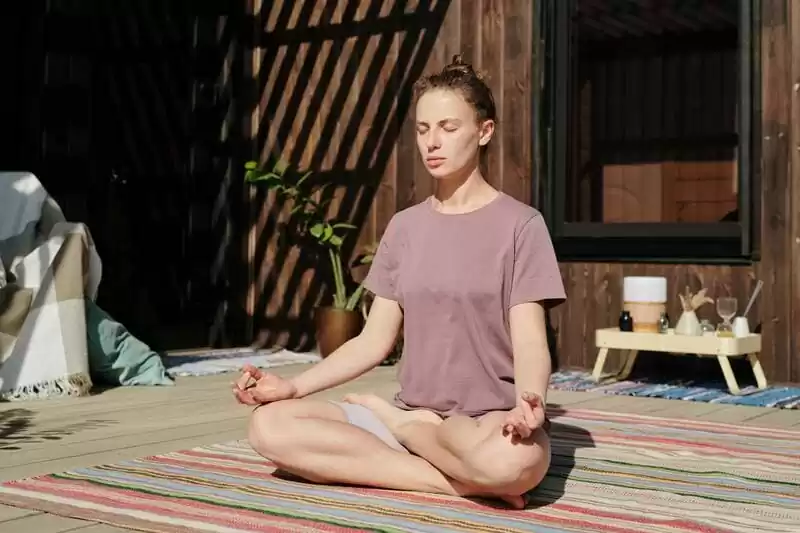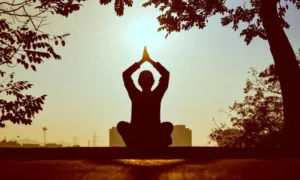5 Stress Management Techniques To Relieve Stress Instantly
Stress. We all experience it in our life. We all know what it feels like. But what is it, exactly?
According to MedLinePlus, stress is a feeling of emotional or physical tension. It can come from any event or thought that makes you feel frustrated, angry, or nervous. Stress is your body’s reaction to a challenge or demand. In short bursts, stress can be positive, such as when it helps you avoid danger or meet a deadline. But when stress lasts for a long time, it may harm your health.
There are various stress management techniques. This article mentions the top five among them.
“Fake it until you make it.” There’s more truth and value in this than you may think!

Stress and the Body
This leads to a vicious cycle, because our body always listens and responds to what’s going on. So due to this physical response when we’re stressed, our body becomes even more stressed. It’s a vicious cycle, but the cycle can be broken with enough determination and willpower.
Stress and the Brain
There are two main brain parts associated with stress. The first is the amygdala, which is associated with stress, fear and anxiety. The second brain part associated with stress is the prefrontal cortex. When we’re stressed, there is an increase of blood flow to the amygdala, which becomes activated. Because of this, the prefrontal cortex, which is associated with executive functions in our brain, does not have enough blood to function properly anymore – hence the cloudy thinking. This means we are not able to think straight and clearly anymore.
Five Ways To Relieve Stress
1. Take deep breaths
The first stress management technique is to take deep breaths, starting from all the way in your belly. When we are stressed, we usually start breathing high up in our chest, which triggers our stress levels even further. Breathing from the abdomen allows more oxygen to enter your body, thus giving your lungs more air and room to breathe. Deep breathing activates the vagus nerve, which is a nerve that runs from the neck down through the diaphragm. The vagus nerve then sends a signal to your brain to lower your heart rate. And as we talked about, your body always listens and responds. So as your heart rate lowers, your body also calms down and relaxes again.

There are numerous breathing exercises that you can try, such as Box Breathing, Mindfulness Breathing, Alternate Nostril Breathing, or Belly Breathing. All of them can help with stress relief, so practice some of these techniques and see what works best for you.
2. Movement
By movement, we mean any form of movement. Movement instantly reduces stress levels from your body as well – and this can be anything. You can go to the gym and work out hard. You can go walking. You can go stretch it out. You can go running – it doesn’t matter. Movement reduces stress.
When you are stressed, it takes up a lot of your energy to maintain that feeling. Movement gets rid of that excess energy to help you calm down. Exercise is one of the best stress management techniques as it takes your mind off the situation, plus – it helps you stay in shape!
3. Laughing
The third technique is laughing, and “fake it until you make it” really works here. Your body responds to everything literally. This means that you can trick your body and brain into feeling better. When you put on a YouTube video that’s very funny and you laugh, even if you don’t mean it, your body takes this literally. Your body then responds to the movement and action of laughing and sends a signal to your brain to release the happy hormone called serotonin.
Fake it until you make it now has a whole new meaning: laugh until you feel better.
If you’re feeling upset, turn on a comedy show or just contact a funny friend or family member. There are also plenty of funny jokes out there to take you right out of your funk!
4. Posture

There’s a study that was conducted, where people who were depressed were asked to start playing badminton. You know badminton, like tennis, right? You may wonder, what does this have to do with each other?
5. Meditation
Another one of the main stress management techniques is meditation. Meditation doesn’t just help with stress relief in the moment; it also helps very well to prevent stress. Meditation in the long run, especially when practiced on a daily level, helps to reduce activity in the amygdala. As we mentioned earlier, the amygdala is associated with fear, stress and anxiety. When the amygdala is calm, the mind and the body are calm as well.

We hope you enjoyed reading about the 5 main stress management techniques that you can use for stress relief. What’s even more powerful than using these techniques separately, is using different techniques together. You got this!
Here’s a free Meditation Toolkit for you!
Would you like to start or deepen your meditation journey right away? Here’s a free Meditation Toolkit to help you build a consistent, long-term practice that you love!
Enjoyed this article? Share it!
Keep reading!

Ways to Deal With Discomfort and Pain
Many of us are going through the challenge of pain or discomfort on a daily basis. Depending on the severity, this can stop people from

5 Best Types of Music for Meditation
1. Ambient Music What It Is: Ambient music is a genre characterized by its atmospheric, immersive quality. It often features subtle melodies, slow tempos, and

How Meditation Can Enhance Emotional Connection in Relationships
In recent years, meditation has gained widespread attention for its profound impact on personal well-being. But did you know it can also play an important

Embracing Stillness: 4 Simple Meditation Techniques for Overcoming Cravings
Cravings can be relentless, whether you’re dealing with the urge to eat unhealthy foods, the pull of an addictive substance, or even the compulsion to

Sleep Better, Live Better: Meditation for Insomnia Relief
Insomnia affects millions of people worldwide, leading to various health issues such as fatigue, irritability, and a weakened immune system. One effective method to combat

Clarity Amidst Chaos: How to Use Meditation for Concentration and Focus
Let’s talk about why meditation for concentration and focus is important. Focus is a crucial aspect of daily life that allows individuals to concentrate their


